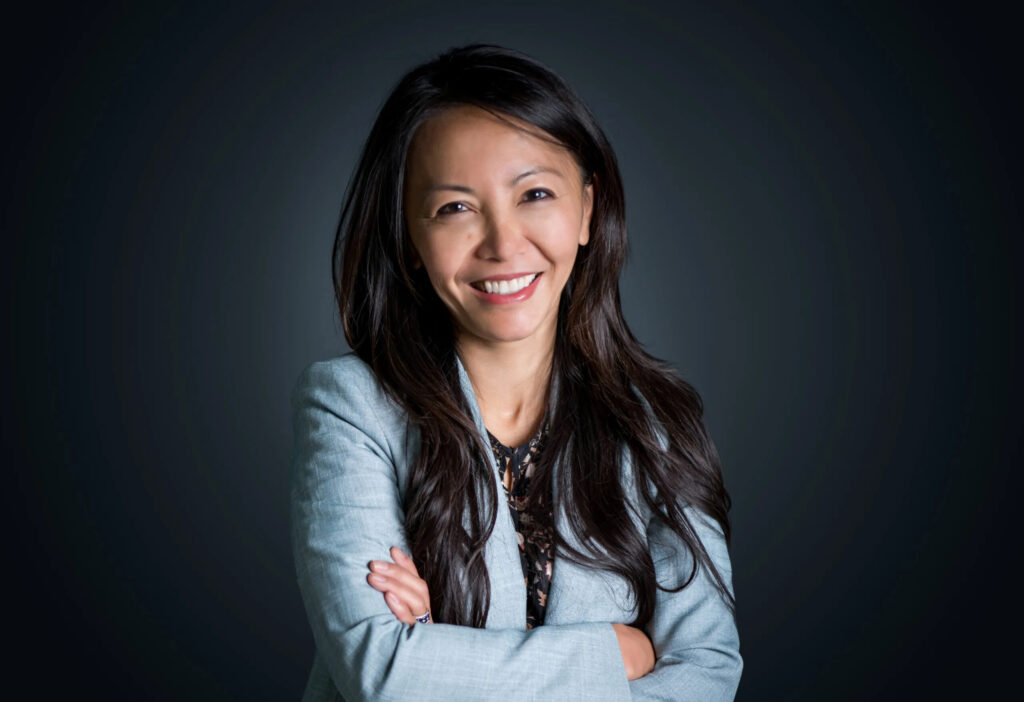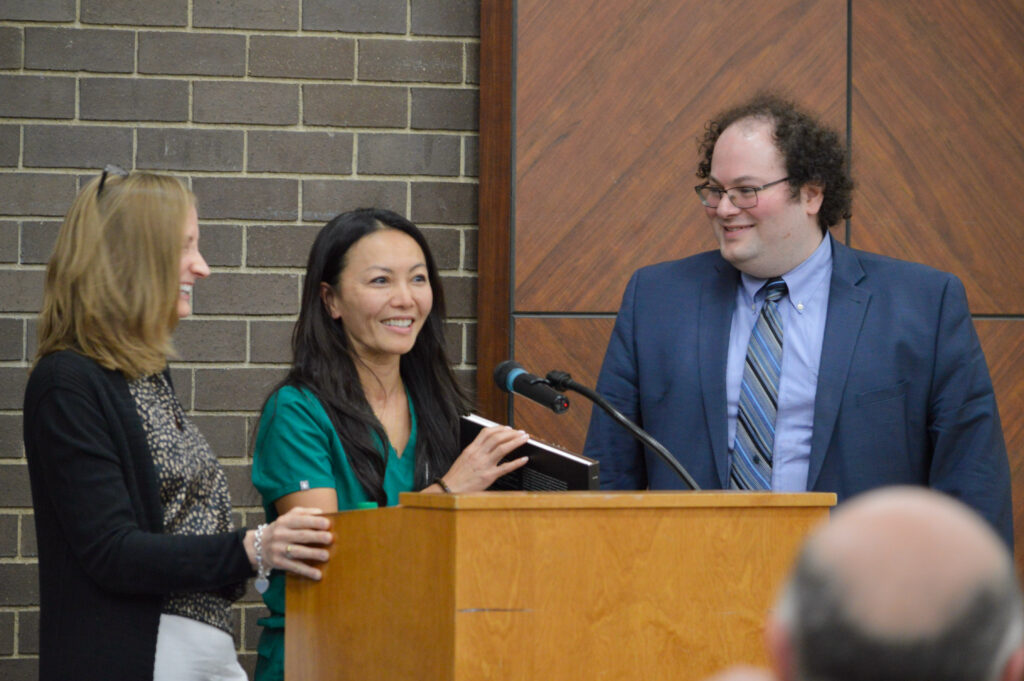By Alyssa Schmitt

Photo / Kim Ponsky
When Ukrainians fled their country after Russia invaded over a year ago, Dr. Diana Ponsky couldn’t help but draw a parallel to her own life.
She came to the United States as a child, with her family nearly penniless around 1980, fleeing from Vietnam at the end of the war and when communism was on the cusp of taking over.
Her family grabbed all they could carry, but needed donations from others to survive.
“You literally pick up everything and go,” she explains. “It was necessary because you didn’t know if you were going to be hit by bombs. You didn’t know if your house was going to be burnt down if you stayed.”
While volunteering at the Medworks and MedWish International Ukrainian drives with her husband and children, she was packing goods that would help other families survive their own escape from war. A member of Park Synagogue in Pepper Pike and Cleveland Heights, the mother of three saw how the unfolding current events could help her bring the context of her own history to her children.
“The way I prefaced it was, ‘That’s how we got started when we came here,’” Ponsky, 49, explains. “We wouldn’t have been able to get as far without help from people who donated.”
It was that same compassion – along with a tremendous amount of hard work and a hint of luck – that helped Ponsky rise from poverty and eventually open a private practice as a plastic surgeon in Beachwood. And throughout her journey, she’s passing that compassion on to others.
ENTERING AMERICA
In 1979, Ponsky, who was six years old, left Vietnam with her parents, three younger sisters and aunt.
They headed toward the Indonesian islands by boat, where they lived in a refugee camp. Ponsky recalled straw-roof huts and playing in the sand with cans.
“It was not your glorified Indonesian type of vacation,” she says.
After a year and a half, the family was sponsored by Episcopalians in Allentown, Pa., where they stayed for another year and a half before moving to New York City so her parents could pursue more job opportunities.
There, Ponsky entered third grade where she met a teacher who introduced her to Nancy Drew novels and helped her transition to American life. That same teacher was also behind Ponsky’s first name.
“My third-grade teacher was pivotal,” Ponsky says. “My Asian name is Dai, and I got made fun of by kids a lot. She changed it to Diana because of Princess Diana.”
Before entering sixth grade, her parents split up and she moved back to Allentown with her mother and siblings. However, as high school approached, she moved back to New York to live with her father and tested into better high schools than were available in Pennsylvania.
The frequent moving and always living in a different city from part of her family created instability in her life, she says. On top of it, there was the pressure of constantly working to survive.
“We were dirt poor when I was growing up,” she explains. “My parents spent all of their money getting over here, and so I had to work.”
It was her aunt who helped her keep sight of the importance of education.
“Back in Vietnam, (my mother) never went for secondary education whereas my aunt did,” she says, adding that her aunt was like a second mother. “My aunt always told her, you have to have the kids go through school, finish college, because that’s the way to making a better future for yourself.”

Photo / Akron Jewish News / Courtney Byrnes
RECONSTRUCTING CONFIDENCE
Ponsky joked that growing up in an Asian family, you’re pushed to be a doctor or a lawyer. Luckily she became fascinated with sciences early on after attending a science camp while living in Allentown. Still, she wasn’t planning on going into medicine.
She worked through high school and college at a dermatologist’s office, starting as a receptionist and moving up to office manager.
The dermatologist, Dr. Lilianna Sauter, left Switzerland during World War II and traveled to the U.S. to start her practice.
“It was tougher for (foreign graduates),” Ponsky says. “Despite that, she was able to open up an office on Park Avenue and make a name for herself.”
Ponsky assisted Sauter at events where she gave lectures, while simultaneously being introduced to museums and the National Academy of Sciences.
“I would go there to get her paperwork, and interestingly, it gave me exposure to that world,” Ponsky explains. “Without me knowing, she was kind of teaching me about that world.”
Ponsky could peer inside the life of a physician and get an inside look at meetings held between doctors, yet still, she wasn’t sure she wanted to go to medical school. It wouldn’t be until the end of her undergraduate career at New York University, where she studied biochemistry on a full scholarship, that she chose to go to medical school. It’s a decision she credits to the influence of Sauter and a chemistry professor whose lab she worked in.
However, initially rejected by medical schools she applied to, she instead went to Georgetown University in Washington, D.C., to earn her master’s degree in biophysics. Upon completion of her master’s, she was accepted into medical school at Georgetown and went on to discover her interest in surgery – specifically around the nose and face.
She spent two years after her residency working in surgery with cancer patients at the Veteran Affairs hospital in Fairfax, Va., before becoming more involved with veterans who needed facial reconstruction. That would soon pave the way for her to seek a fellowship focused on reconstruction. She saw how building back someone’s face could give them a sense of normalcy and even build their confidence back up, she explains.
Ponsky’s husband, Dr. Todd Ponsky, is from Cleveland and they wanted to move back after his medical fellowship in Denver. She took a plastic surgery fellowship at Case Western Reserve University Medical Center around the same time.
Through this specialty, she grew to have a passion for helping patients who experienced domestic abuse. As part of a nonprofit called Face to Face that pairs patients who lived through harmful situations with plastic surgeons, Ponsky was introduced to a woman who was a domestic abuse survivor and traveled to the U.S. to undergo facial reconstruction.
“She comes in and she’s like, ‘I just want the reminders of it gone,’” Ponsky recalls. “It was two-fold – helping her with a functional problem of breathing, but also restoring her normalcy so that she doesn’t have reminders of it.”
After opening her own practice seven years ago – first in Lyndhurst, then moving to Beachwood after the first year – most of her cases are now more cosmetic in nature. Still, she finds it rewarding to give people the confidence they need to go out into the world.
“My job, when I make minor treatments, or minor adjustments, is to allow them to see themselves in a more positive light so they can have that extra self-confidence,” she explains. “I’m more of a naturalist, I don’t want it to be overdone (or) over-embellished.”

Photo / Henry Bernstein / Three Driveway Media
REMEMBERING HISTORY
Ponsky was raised Buddhist but converted to Judaism when she became engaged to her now-husband and wanted to raise her children in one religion. On a recent trip to Israel for her daughter’s bat mitzvah, Ponsky could see the history of the Jewish people having to fight against obstacles in front of her.
Her husband pointed out that explaining her own history to her children would help them understand why she stays passionate about helping others, and why they should work hard in school.
“Once you forget where your history is from, it just makes you lose sight of things,” she says.
“There are so many similarities in their cultures that I just felt like it was natural,” she adds of her children’s heritage.
Her background and deep care to improve the world have led her to give back within the local Jewish community.
“The part that most resonates with me is the fact that … whatever you do, just try to leave the world in a better place,” she says.
Sam Chestnut, head of school at The Lippman School in Akron and chief program officer of the Jewish Community Board of Akron, says Ponsky’s passion for giving back is obvious. She’s finishing her first year as board president at Lippman.
“I think she cares about the kids because she recognizes that she doesn’t take for granted her own growing up and becoming the professional she is, and knows that people need help along the way to get to where they are,” says Chestnut, 51. “She’s the first one to help, always. … And she doesn’t want anything in return. She just wants to leave a positive impact on others.”
Ponsky is in the process of expanding her practice and adding additional exam rooms and more space for her clinical staff, she says. She also finds time to teach current University Hospitals residents in an effort to continue the positive impact more experienced physicians have on newer doctors, as she had during her own residency.
She was recognized by Castle Connolly, a peer-reviewed directory of doctors and hospitals, with its Exceptional Women in Medicine award in its list of Top Doctors for 2023. And, she has been named to the list for seven years in a row, according to a news release.
Between school board meetings at Lippman and work at her practice, she continues her volunteer efforts at MedWish and Medworks – two Cleveland-area medical humanitarian organizations – bringing her children along to see the impact helping others can have.
“I think if I looked at where I came from and what I’ve done, I would have to say that I got very lucky in my life for things aligning for me,” she says. “And being able to be where I am because of great mentors along the way who coached me into certain areas.”
